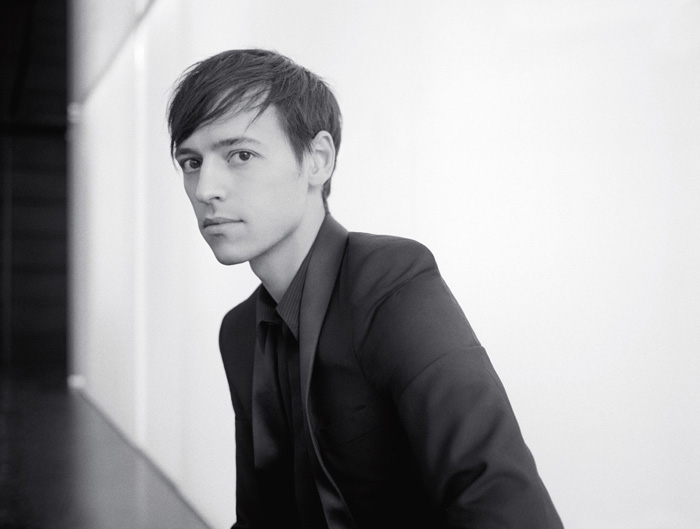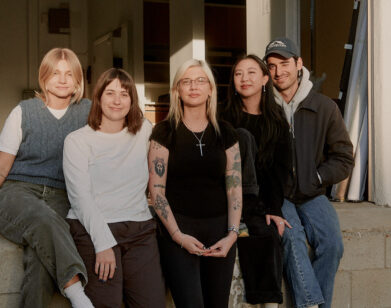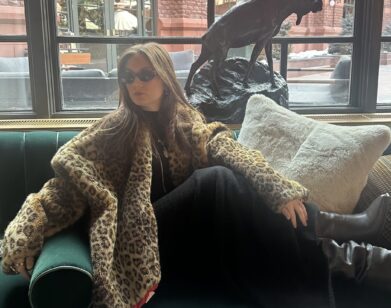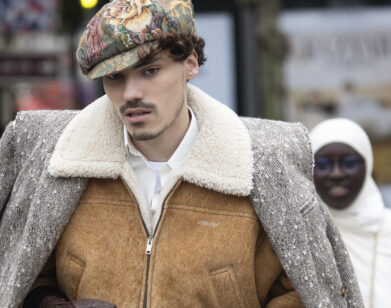Gender Trouble: Nicolas Andreas Taralis

“Gender is a kind of imitation for which there is no original,” wrote Judith Butler. And nature vs. nurture, Nicolas Andreas Taralis ain’t bothered. The Canadian-born, Paris-based designer prefers to think of fashion in terms of a joint, coherent universe free of gendered constraints. Hailing neither androgyny nor provocation, his collections are adopted, both on and off catwalks, by both sexes.
Represented by the matriarch of French publicity Michèle Montagne, who coached Ann Demeleumesteer and Haider Ackermann to fame, his designs are characterized by strong lines, strong blacks and classical tailoring. Before focusing on his label, he learned under Helmut Lang, cut his teeth with Hedi Slimane, and worked as head designer of Cerruti.
We met him on the dodgy end of Montmartre for a café and croissant, before he dashed off to his studio in pre-fashion week blitz. Taralis’ presentation is tomorrow.
ALICE PFEIFFER: Is gender something important to you?
NICOLAS ANDREAS TARALIS: It’s true, there is little separation for me there. But it is not something I think about; I never tell myself, “Right, it’s time to be androgynous.” It’s one universe, an organic continuation. I like the idea of both being intertwined. I follow my tastes and instincts and what comes to me spontaneously. I tend to go for something more structured, sharp, tailored.
PFEIFFER: Where does this attraction come from?
TARALIS: Before deciding to work in fashion, I was attracted to architecture for a long time. At about the age of 12, I discovered people like Frank Lloyd Wright—fashion is in fact very close, it’s just a different way of working on a volume. But fashion is more sensual, more intimate.
PFEIFFER: Why did you decide to come to Paris from Canada?
TARALIS: To me, when thinking of fashion, I’ve always first thought of Paris first, before New York or Milan. Growing up in Canada, fashion felt so distant, so abstract, and was always a source of fantasy.
PFEIFFER: And since you’ve entered the fashion world, do you think Parisian fashion has changed much?
TARALIS: Not Paris specifically, but fashion and culture has changed a lot in the past decade. The relevance and place of fashion, in culture and individual existence, is questioned. I feel that before, people were a lot more excited about fashion. Today, a lot less emphasis is placed is on know-how and quality; life and human interactions are increasingly dematerialized. Sure, fashion has always sold an image before a product, but the increasing importance of intangible images is leading to a changing relation to the self, human relations, and inevitably, how one consumes fashion. This is something I’ve been thinking a lot about lately, about the relevance of what I’m doing, where it is going, the direction fashion is taking.
PFEIFFER: Talking of old-school know-how—you have worked alongside renowned designers, is it difficult to break from the association?
TARALIS: No. In every other creative industry—art, music, architecture—no one is ashamed to talk about his or her inspiration and roots. But in fashion it’s considered a problem, an obstacle, something difficult to bypass. I don’t think it’s difficult. It can open doors, but mainly, it shows you that if you start something with a true passion, you’ll find your own unique path.






